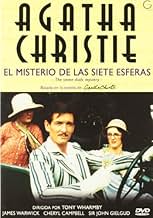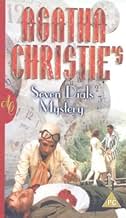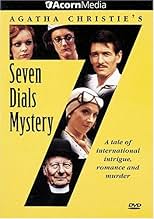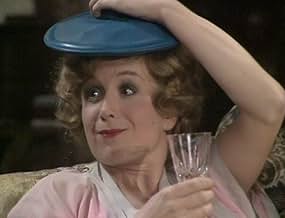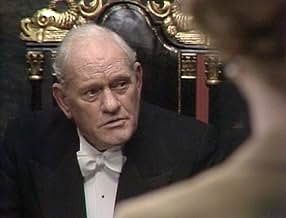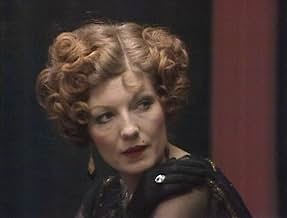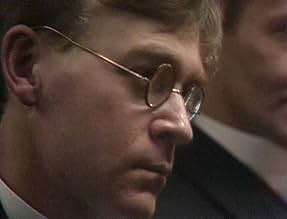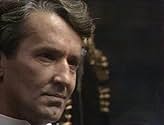Ajouter une intrigue dans votre langueLady Eileen "Bundle" Brent is a pert, aggressive young aristocrat who insinuates herself into a series of murders, stolen state secrets, and a mysterious secret society.Lady Eileen "Bundle" Brent is a pert, aggressive young aristocrat who insinuates herself into a series of murders, stolen state secrets, and a mysterious secret society.Lady Eileen "Bundle" Brent is a pert, aggressive young aristocrat who insinuates herself into a series of murders, stolen state secrets, and a mysterious secret society.
- Réalisation
- Scénario
- Casting principal
- Vera
- (as Henrieta Baynes)
Avis à la une
The plot doesn't recount well - basically, several outrageously wealthy young aristocrats amuse themselves by chasing after a secret society called the Seven Dials. But the pace moves right along, and the oh-so-British styling is wonderful, including discreet foreign policy dealings amid cards and cocktails at country house parties (populated by perfectly-coiffed young ladies in flapper dresses, of course).
Not for everyone, but British mystery buffs will eat it up. 1920's obsessives will also want to see this one just for the gorgeous costuming and a series of stunning vintage cars that look as though someone raided a Concours d'Elegance just for this film.
For instance, "The Seven Dials Mystery" is a beautiful filmed production set among the magnificent houses of the great if not so good between the two World Wars, far from the tranquil world of Miss Marple.
There is no middle-aged Belgian detective or village busybody here, but a pert girl with impeccable breeding and a nose for adventure.
In "The Seven Dials Mystery," originally written in 1929, and produced as a British TV film in 1981 (directed by long-time "NCIS" director Tony Wharmby) , Christie's sleuth is a young noblewoman named Lady Eileen "Bundle" Brent (Cheryl Campbell) . Just a few years older than Nancy Drew, this delightful daughter of a marquess (Sir John Gielgud!) engages in some very clever (and very dangerous) detective work.
Set in a gorgeous old pile, and involving a whole House of Lords of wealthy aristocrats, including several very rich and (sigh!) very stupid gilded youth, "The Seven Dials Mystery" has plot enough for a dozen mystery movies.
During the day, Bright Young Things screaming, "By Jove!" and "I say!" play away the hours. But as mysterious gunshots ring out at night, to the grim accompaniment of ancient clocks tolling away the hours, the bodies begin to add up.
As the cute "Bundle" Brent tries to figure out what's going on, Dame Agatha adds still more layers of mystery to the puzzle, and what started out as almost a day trip to the Fun House becomes a terrifying excursion into the unknown.
Along for the ride is the great Sir John Gielgud, in a charming, often hilarious performance as an eccentric peer of the realm (he easily steals every scene he's in), and the marvelous Harry Andrews, as, of course, a Detective-Superintendent from Scotland Yard.
Christie doesn't let you off lightly, and there are nuances and subtleties that you might miss on your first viewing. So watch "Seven Dials Mystery" over and over, and don't look at the clock while the movie's playing, because Dame Agatha has a surprise for you every minute of the film.
This comes close in terms of Christiness. That's because it is a pretty faithful rendering of the book. As such, it follows her nice form of introductions. In these novels, it is all a game of defining people that sew into each other. The people come first and we find of course that by the end we have sewn them together incorrectly because of the simple order in which they were introduced.
Christie (and others, Sayers) have this game of limited watching. Everything we see is true, but we don't see everything we need to in order to weave a coherent narrative until the end. That's when we revisit many scenes, which we "see again." Its all about seeing, really. And that's especially so when she writes book without her regular detectives. With the detectives, there is some internal sight, some mental perspectives, but with these it is purely about what is seen physically.
Here's the interesting part. Movies, and especially these puzzle movies are also about what we see and what we don't. That's the root of the cinematic experience. But Christie didn't write with a cinematic imagination. So the two conventions of visual trickery are close but not the same.
That's why I'm so fascinated by films of Christie stories. It is a wonderful cinematic challenge for the filmmaker, and in a way because all this is collaborative construction one for the viewer as well.
This adventure plays with secrets in three ways (signage, association and "state" secrets) and allows us to confuse them by natural assumptions that prove false. It is clever. As a book it is clever, I mean.
As a film, it goes on too long and asks us to accept some rather extreme portrayals.
Even with its length and observance of the story, there is a pretty jarring discontinuity between the first part of a large group of young, silly people. We need this large number to justify the eight clocks. But managing so many red herrings in a movie isn't feasible so all the girls are dropped.
Ted's Evaluation -- 2 of 3: Has some interesting elements.
Le saviez-vous
- AnecdotesFollowing the success of their version of Why Didn't They Ask Evans? (1980), the same production team reunited for this Agatha Christie adaptation, including Pat Sandys, Tony Wharmby and Jack Williams. Both productions also included the actors: John Gielgud, James Warwick, and Robert Longden.
- GaffesThe raised roman numeral for the "eleven" o'clock position on the hoods is reversed reading 'IX' instead of 'XI' during the first meeting shown. Later in the movie it is corrected, but they didn't make new hoods; instead they inked over the raised leading 'I' and added a gold paint 'I' after the 'X'.
- Citations
Marquis of Caterhan: Inconsiderate, that's what I call it, distinctly inconsiderate.
Lady Eileen 'Bundle' Brent: People have to die somewhere.
Marquis of Caterhan: Well they don't need to die in my house.
Lady Eileen 'Bundle' Brent: Lots of people have, masses of stuffy old great grandfathers and grandmothers.
Marquis of Caterhan: That's quite different. Of course I expect family to die here. But I do object to strangers!
- ConnexionsVersion of The Seven Dials Mystery
Meilleurs choix
Détails
- Date de sortie
- Pays d’origine
- Langue
- Aussi connu sous le nom de
- Das Geheimnis der sieben Zifferblätter
- Lieux de tournage
- Société de production
- Voir plus de crédits d'entreprise sur IMDbPro

